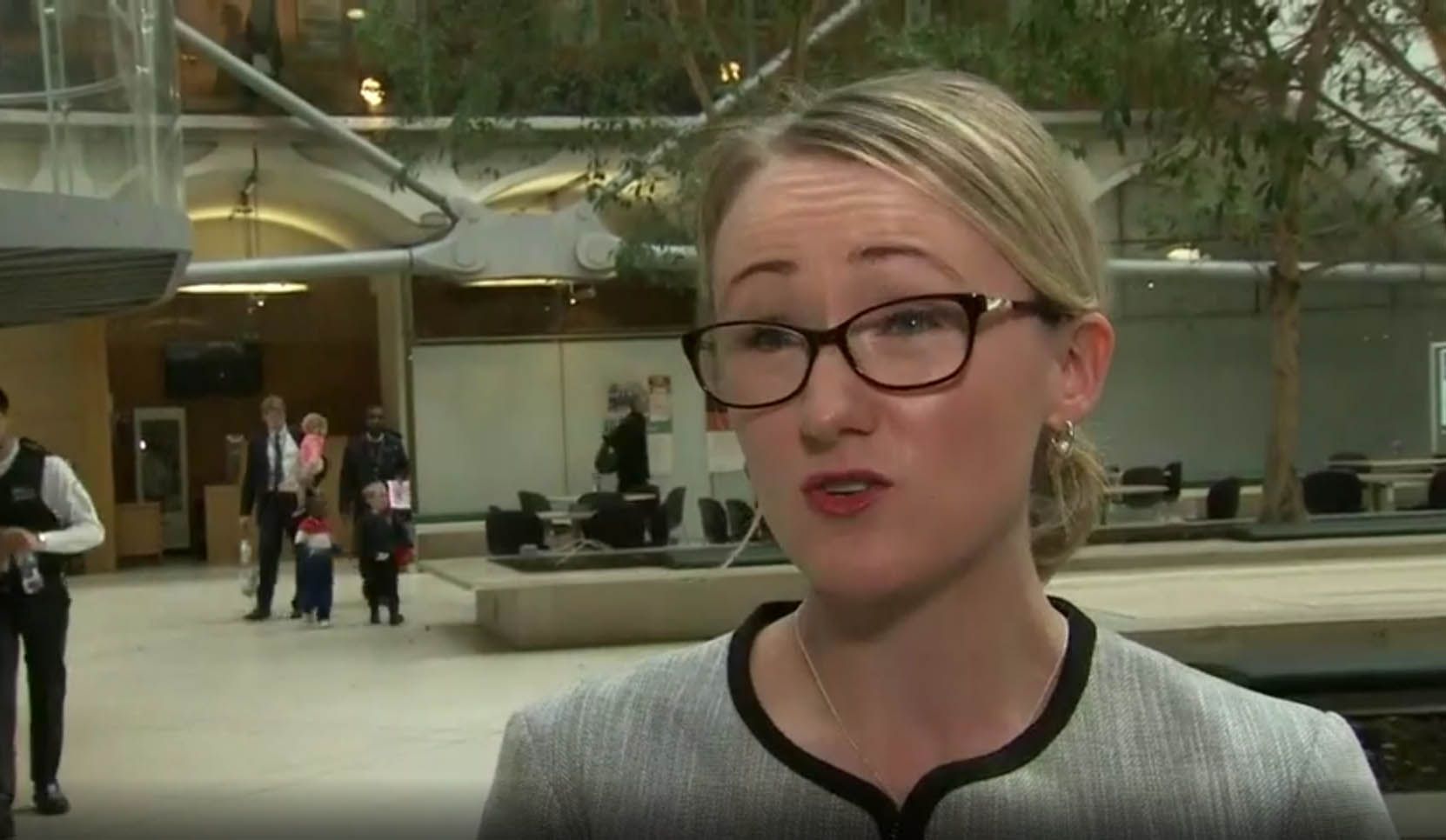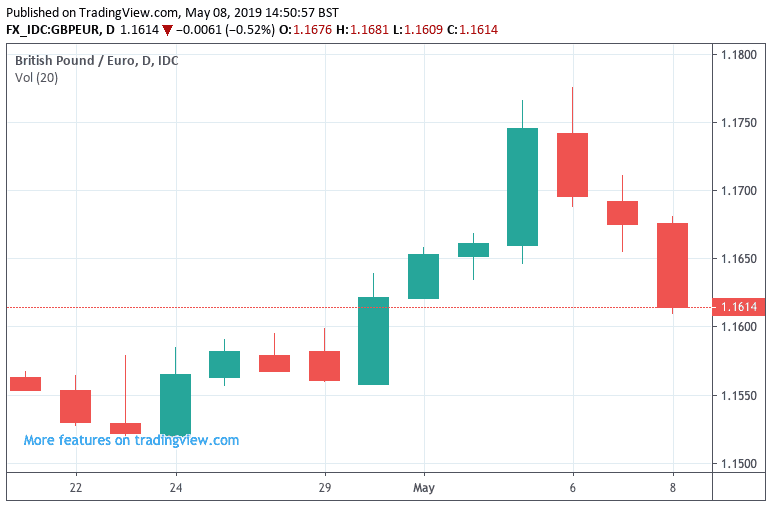Pound Sterling Deeper in the Red as Brexit Talks Said to be Close to Collapse

Above: Senior Labour Party Brexit negotiator Rebecca Long-Bailey. Image Pound Sterling Live, Still Courtesy of BBC News.
- Snapshot: GBP/EUR: 1.1615 -0.50% | GBP/USD: 1.3010 -0.44%
- Cross-party Brexit talks said to be close to failure
- Odds of May leaving office in 2019 sit at 80%
The British Pound is trading notably lower in mid-week trade with markets finding little positive in the latest updates concerning the status of cross-party Brexit talks which are now close to being abandoned.
According to broadcaster ITV's political editor, talks between the Government and Labour to break the Brexit deadlock are on the verge of collapse.
Those involved in the negotiations say they have no expectation that there will be a breakthrough and the talks could be pronounced dead later on Wednesday, Robert Peston reported.
"Labour's negotiations on a Brexit pact with the Government may well be pronounced dead today - partly because the party is launching its EU elections manifesto tomorrow and would presumably need to say something about a possible pact other than "don't know". To be clear, there are more talks between the two sides this evening. But those involved tell me they have no expectation a breakthrough will be seized from the jaws of futility," says Peston.
Labour Party negotiators have meanwhile described the government as being disingenuous the matter of agreeing to a customs union. "Nothing's been agreed yet, the discussions today were very robust and we are having further meetings this week," says senior Labour negotiator Rebecca Long-Bailey, "we hope to make some progress." However Long-Bailey says the Government is yet to move on its red lines and it therefore remains difficult to see how progress can be made until there is a shift.
Labour have made the entry into a customs union as a red line, and according to reports from the BBC's Political Editor Laura Kuensseberg, the Government is yet to move on the matter.
"Labour sources says ministers more or less admitted they weren't really putting much that was different on the table - they say they will still pursue an FCA, then go to bare bones customs union if that fails, with more explicit language about that in the political declaration," says Kuenssberg.
The Government described Tuesday's talks as "detailed and constructive" while a Labour source told Kuenssberg they were "tense and robust".
"The Pound has slipped... with optimism over cross-party Brexit talks fading amid substantial criticism over the customs union plans that appear to form the backbone of any agreement between May and Corbyn," says Joshua Mahony, Senior Market Analyst at IG. "Ultimately such an agreement would limit the UK’s ability to form unilateral trade deals and will face a substantial pushback should such a deal reach parliament."
The Pound was a standout performer having rallied by a percent against the Euro and Dollar last week after Labour leader Jeremy Corbyn and Prime Minister Theresa May indicated they were ready to get a deal done in the wake of the poor showing by both parties in local elections.
We warned at the time that should a breakthrough be delivered this week those gains would be given back, and as attested to by the above graphic, by the mid-week point those gains have indeed been relinquished.
Negotiators will meet again today, "but if today was meant to be the moment when impetus from the election shambles for both main parties spurred them to a constructive conclusion, it was not - sounds like they had a bargy for several hours over customs policy," says Kuenssberg.
Joe Manimbo, foreign exchange analyst with Western Union describes this as a "critical week" for Pound Sterling as the final round of Brexit negotiations between the government and Labour could shift the course of Brexit.
"Hopes of a cross-party consensus being reached are beginning to cool as both the Conservative party and Labour party appear to be losing confidence and trust in one another. In a data-dry week until Friday, Sterling will be driven by Brexit updates and sentiment trading," says Manimbo.
The Pound-to-Euro exchange rate is quoted at 1.1632, but the pair had gone as high as 1.1776 at the start of the week on growing hopes that last week's performance at the local elections by both Labour and the Conservatives would spur both sides towards striking a deal.
The Pound-to-Dollar exchange rate is quoted at 1.3029, the exchange rate had been as high as 1.3150 earlier in the week.
Time to move your money? Get 3-5% more currency than your bank would offer by using the services of foreign exchange specialists at RationalFX. A specialist broker can deliver you an exchange rate closer to the real market rate, thereby saving you substantial quantities of currency. Find out more here. * Advertisement
"GBP will continue to trade within a relatively tight range until there is more clarity on the future Brexit path. After Brexit negotiations between PM May and the opposition Labour party did not go as well as PM May hoped on Tuesday, the UK government has now set 1 August as its latest target for exit day," says Kim Mundy, a foreign exchange strategist with CBA.
While Sterling has come off its highs, it does remain the best-performing major currency for 2019.
"With the dust having settled on the local election results, the perceived risk of an imminent general election has diminished further," says Adam Cole, a foreign exchange strategist with RBC Capital Markets.
UK bookmakers’ prices imply just a 22% probability of an election this year (from a peak of over 50%) and the probability of an election in 2019 or 2020 has slipped below 50% for the first time this year.
"Offsetting this diminishing risk, however, is the near-certainty of May departing and likelihood of replacement with a Eurosceptic leader (Johnson is runaway favourite). GBP remains trapped between domestic political risk (downside) and ongoing risk of a second referendum (upside; 27% probability)," says Cole.
May's Future a "Thorn in the Side" of Sterling
The other key issue we are watching this week is the pressure being exerted on May by Conservative Party MPs to detail her exit from Number 10.
According to bookmakers, May is priced to leave by year-end at 80%.
Sir Graham Brady - the chairman of the 1922 Committee which represents all Conservative MPs that are not ministers - saw Prime Minister Theresa May yesterday and requested from her to set out a binding timetable for her resignation. The 1922 Committee has the power to trigger a binding no-confidence vote in the leader of the Conservative Party, this indeed happened back in December and May won a reprieve. May is now immune to another challenged for a year under existing rules.
Last week the 1922 Committee's executive tried to ammend the rules to allow another go, but coup plotters lost.
Reports suggest another attempt would succeed in light of the Conservative Party's dismal showing in recent local elections.
A spokesperson for the Prime Minister insisted the meeting with Brady was routine, but pressure is mounting, with local Conservative associations confirming they will hold a vote of confidence in her leadership on 15 June. (This is non-binding).
Following the Conservative Party's humiliation in the local elections and the anticipated humiliation in the forthcoming EU elections, "there is an expectation and hope among Tory MPs and her cabinet colleagues that she will announce a departure date that would allow Tory MPs to choose their shortlist of two candidates in June or July - which would then permit hustings of Tory members over the summer and the election of the new leader before the Tory conference," says Robert Peston, Political Editor at ITV.
But close colleagues of May have apparently told Peston she wants to still to be Prime Minister and party leader at the Autumn party conference, which would showcase the duo of potential leaders picked by MPs, prior to that final vote by members. This stance by May is confirmed by Sam Coates, Deputy Editor of The Times, who says Downing Street has indicated that it was working to a new deadline for solving the Brexit impasse that would mean her remaining in office for up to four more months.
"I can find no senior Tory who thinks the party will permit her to do that. And we should learn more about when and how she goes in the next 24 hours, because Brady will communicate the PM’s response to his executive tomorrow afternoon. And they in turn will have to decide whether she has either given an acceptable resignation timetable, or failing that whether to step up the pressure on her to do so by changing Tory party rules to permit a new vote of no confidence in her within weeks. As I have said before, she remains PM despite her party, not because of it. And although her superpower is to defy political gravity, even she can’t ignore her party forever," says Peston.
The leadership question "is a thorn in the side of GBP markets looking for progress on a cross-party Brexit deal. Best outcome now: PM can negotiate her exit, negotiate a deal & leave Brexit in the hands of a moderate Tory," says Viraj Patel, a foreign exchange strategist with Arkera.
The 1922 Committee’s executive will apparently meet today to determine whether to change the party rules in an attempt to oust May. Under the present rules she cannot face a formal vote of no confidence until December, a year after the last failed attempt.
"Even those who do not want her to leave immediately admit that pressure is growing," says Coates.
One former minister, loyal to May til last time round, told the BBC's Kuenssberg she has to now go because "she is sucking up the oxygen her successor will need".
But, other sources tell Kuenssberg changing rules now "is crackers - attempts to oust her have produced sound and fairly".
"What most agree on though is if there were to be another confidence vote in PM by MPs, she wouldn’t survive it again - that’s why the meeting today matters - a rule change could set off chain of events that sees new PM before summer - whatever new deadline No 10 come up with," says Kuenssberg.
Time to move your money? Get 3-5% more currency than your bank would offer by using the services of foreign exchange specialists at RationalFX. A specialist broker can deliver you an exchange rate closer to the real market rate, thereby saving you substantial quantities of currency. Find out more here. * Advertisement

